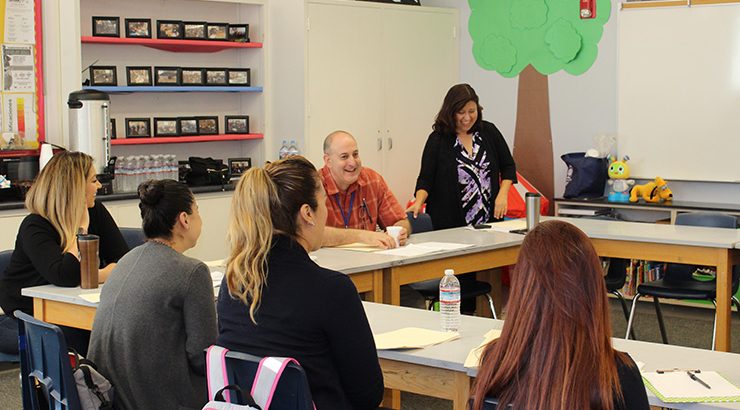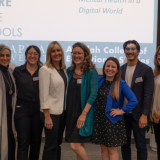
Chapman ePrize Initiative Promotes Public School Parent Engagement and Student Achievement ePrize leadership teams share lessons learned from 3-year parent engagement project
October 27, 2021
The leadership teams from a three-year, donor-funded public school initiative joined Chapman University faculty for a virtual panel discussion to share lessons learned and unexpected benefits. The panel participants were part of Chapman’s first ePrize (Education Prize) project on parent engagement in K-12 public schools.
Panel co-moderators Dr. Michelle Samura (Associate Dean for Undergraduate Education and External Affairs in Chapman’s Attallah College of Educational Studies) and Mark Percy (President of the CEO Leadership Alliance) were joined by leaders from Anaheim Union High School District (AUHSD), Santa Ana Unified School District (SAUSD), and El Sol Science and Arts Academy, an independent charter school in Santa Ana:
- Monique Daviss, Executive Director of El Sol Science and Arts Academy
- Sara Flores, El Sol Director of Community Life and Early Childhood Education
- Diana Fujimoto, AUHSD Curriculum Specialist
- Michael Matsuda, AUHSD Superintendent
- Rigo Rodriguez, President of SAUSD Board of Education
- Jenny Zavala, El Sol Director of Curriculum and Instruction
The discussion, which was recorded and is available on demand, served to wrap up the three-year Parent Engagement Initiative (PEI) project facilitated by the ePrize, which was awarded through Chapman’s Attallah College of Educational Studies.
ePrize Parent Engagement Initiative
Initially awarded in 2017, the first ePrize funded a Parent Engagement Initiative (PEI) project involving AUHSD, SAUSD, and El Sol. Through consultation and training from AUHSD, PEI project partners worked together to implement and customize AUHSD’s innovative Teacher Reflective Learning Walks (TRLWs) and Parent Learning Walks (PLWs) at El Sol and SAUSD’s Manuel Esqueda K-8 School.
Funded by a $100,000 per year gift, supported by the Pamela and Andrew Horowitz Family, the three-year ePrize project sought to improve student achievement by strengthening collaboration among educators, across districts and grade levels, and expanding the breadth and depth of parent engagement.
The ePrize as a whole also sought to foster collaboration between Orange County district and charter public schools around innovation in order to improve educational outcomes for underserved students.
Rich Collaborative Environment
During the recorded virtual discussion, the panelists shared key insights and lesson learned from the project.
Given the similar demographics and challenges in Anaheim and Santa Ana communities, a main goal of implementing the Parent Learning Walks (PLWs) was to develop both a robust learning environment for students and a welcoming environment for our parents, regardless of each parent’s education level.
Diana Fujimoto, one of the AUHSD trainers, said the PLWs create a space in public school where parents “feel they have a voice, and where they feel they are active and empowered and part of the school community.”
All the panel participants felt the ePrize project created a rich environment to advance best practices among public educators.
“I think this grant opportunity gave us the opportunity to reach across sort of invisible barriers between large districts and large communities, as well as small charter schools,” said AUHSD’s Superintendent Matsuda. “I think that’s really something that broke new ground in Orange County, to build this institutional relational capital that began with leadership.”
COVID and Distance Learning
One unexpected outcome was the PEI partner schools and districts felt they were better prepared to face the challenges for the unexpected shift to distance learning due to the global pandemic.
El Sol’s Executive Director Monique Daviss explained that El Sol already had extensive parent engagement, but the PEI Project left them better able to adapt to unexpected shifts caused by the global pandemic.
“Based on our Parent Learning Walk experience, we felt prepared to take parents to the next level with distance learning,” said Daviss. “I think as we go forward with additional unknowns – What will next school year look like? What will the years following look like? – having structured opportunities for parents to be involved and engaged will continue to be important.”
AUHSD’s Superintendent Matsuda believes having the parent engagement model already in place prior to the pandemic put his district and their project partners in a stronger position as it laid the foundation for trust in public schools.
“We’re in a much stronger position moving forward to expand services and build vibrant community schools,” said Matsuda. “A huge takeaway out of all of this is that we are in a much stronger position out of learning from each other. Parents engagement has built trust in our public schools at this pivotal juncture.”
Visit the ePrize award webpage for parent testimonials from parents who participated in El Sol’s Parent Learning Walks.
SAUSD PLW Expansion
Dr. Rigo Rodriguez, President of SAUSD Board of Education, said the ePrize PEI Project helped shift SAUSD toward a parent empowerment model.
“This project has shifted our way of looking at parent engagement so that it is inclusive of and linked to the quality of instruction of the child and the teacher, particular around 21st century learning,” said Dr. Rodriguez.
After successfully implementing the PLWs at Esqueda, Dr. Rodriguez says SAUSD has plans to scale it up its PEI to 20 additional elementary schools across the district.
“The consulting and coaching that we got from Anaheim Union High School District and then our peer-to-peer learning from Esqueda and El Sol, all of that was just a very rich environment within which to advance the best practices in the school district,” said Dr. Rodriguez. “Without this collaboration and without having a proof of concept for our district, we would not be able to scale up with confidence.”
PEI Research Project
Aspects of the ePrize PEI project are being further investigated by a research study led by Attallah College’s Drs. Angel Miles Nash, Michelle Hall, and Margaret Grogan.
The study, entitled “It Takes a Village: Investigating Parents’ Experiences in School-Family Partnerships Across Two Public School Contexts,” is focusing on three research questions to explore parents’ experiences before and after engaging in PLWs.
- How do parents’ experiences with PLWs inform their engagement with school personnel and understanding of student experiences in traditional public schools and public independent charter schools?
- How do school personnel develop asset-based policies and programming to partner with parents?
- In what ways has the COVID 19 pandemic’s forced remote learning and return to campus influenced the efforts to engage families in these schools?
Supported by a grant from the Spencer Foundation, this study builds on previous research aligning parental involvement with children’s academic success and contributes to the field by examining how parents and educators experience PLWs across different school contexts.
Serving Students and Families
Dr. Samura concluded the virtual discussion by thanking the panelists for taking the opportunity to engage in innovations in education:
“It was an opportunity particularly to collaborate in unexpected ways, with unexpected partners to bring about greater equity in education and to serve students and families, especially those who need it the most.”
Display Image at Top: AUHSD’s Curriculum Specialists Diana Fujimoto and Reuben Patino training El Sol teachers in spring 2018.

